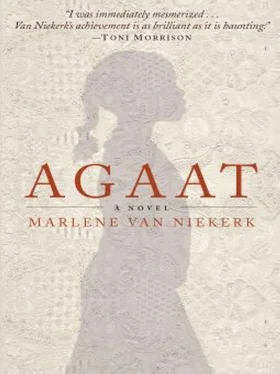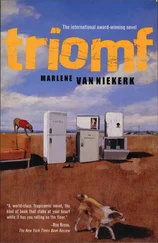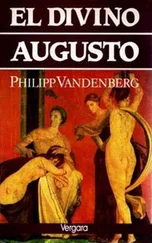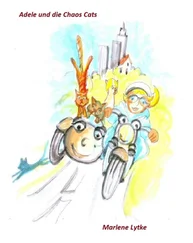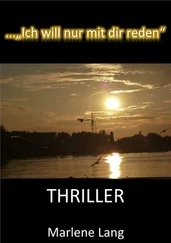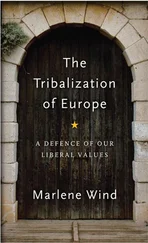A C·I·R·C·U·S! Agaat’s voice sounds the letters. There’s a pause before she recommences. I see the trailing-stitch on her cap, white on white violence.
It wasn’t easy. Nothing was easy about your whole story, let me tell you, it ruined my marriage. And look what I have to show for it now! A C·I·R·C·U·S, A C·O·U·R·T O·F L·A·W!
Agaat straightens up, she stands back, my ear feels cold without her warm breath. What will she reply to her own ventriloquism?
Didn’t know you were so interested in the little old books, Ounooi, but not now, I’ll read to you again tonight. Useful bits and pieces of all kinds.
She tidies up the blue booklets on the pile. For the first time I see the embroidery book and the Handbook and the orange FAK on the dressing table. Exhibits. Chapter and verse.
The lid of the bouillon pot, sings Agaat, must be removed overnight otherwise the bouillon will go off.
A recitative from the Farmer’s Handbook? What’s that supposed to mean?
She looks at me.
It doesn’t have the desired effect on me. I flicker at her: Go ahead and pronounce it now, Agaat! Stop your unfathomable parables. Go ahead and pronounce it all for me so that you can come to your senses, perhaps it will help if you can hear yourself say out loud what you think I think! What you think I ought to think! Mind rape, that’s what it is!
Again she bends by my bed, this time on the other side. Must my ears take turns in this devilish business?
Why do you torture me on my deathbed?
Is Agaat whispering that? In my ear? Am I hearing aright? Her voice is emphatic.
Why do you let me be ravaged by itching, push and pull my limbs, screw open my mouth, taunt me, threaten me with enemas and suppositories, dig in my ears as if you think I have ear-mite, have holes punched into me, shove tubes into me, cut my hair so that I look like a prisoner of war? Why?
She stands back. She answers from her own corner, a smile as if she’s ascending unto heaven. She opens her mouth wide.
When meat is cooked for the kitchen-maid or kaffir, she sings, or even for the house, it’s good to boil it in the bouillon pot for the first hour or so, to extract as much nutrition as possible into the water.
Again her lips are at my ear, I feel the moistness of her mouth.
Then why do you still leave me hanging? she whispers. Why do you come and stand by my bedside in the dark? Do you want me dead? What prevents you?
Sulphured fruit must not be eaten raw, comes her reply, a floating contralto, but first boiled again to drive off the sulphur.
How many voices has Agaat?
Calm down, Ounooi, she says, close your eyes now. Think of other things. You’re wandering again. But it’s not serious, just relax, I’m here, I’m staying with you, I’m not going away, here I am, right here.
She moves in behind the bed, above my head I hear the words that well up in me, lisping they drip from Agaat’s tongue.
And the slops you feed me! I’ll choke. And that will be too soon for you. You still want your pound of flesh from me, remember! Living flesh. What satisfaction would a dead liver give you? A dead heart? You want to pluck me out of the hole with a wire. Like a mole. Well, keep your wire! Soon I’ll be in a hole where even you won’t be able to get at me. Except if you dig me up to chew my bones. Bone hunger!
Agaat appears next to my bed. She looks at me.
How are we doing? she asks. She goes and writes something.
Who marks the day high up there on the calendar? The thirteenth of December, I recall and I remember. Could I have imagined it all? Am I dreaming?
She looks at me, smiles, writes something again.
Abracadabra, she says, twirls a little circle next to her head with her index finger.
Could she mean that I’ve lost my wits? I’m raving? It’s not me, witch! You’re the one who’s raving, you’re the one who’s trying to rave my rave for me! Not a word past my lips for three years now. The mute cannot rave! But they can hear!
There, there, Ounooi, don’t be scared, she says, it’s just the little light, it’s going on and off now. In your head.
That’s a good one! Interprets me to the brink of Babel, to the threshold of death. But there are limits! Back! Stand back! You’re too close! My death is of me! And my bed! There are boundaries!
Agaat goes to stand by the door. She clasps her hands round her body, the knuckle of the small hand in her mouth.
Take the stick, take the stick, I signal.
She comes nearer, takes the stick.
T·H·E·R·E A·R·E B·O·U·N·D·A·R·I·E·S, I spell, B·O·N·E M·A·G·G·O·T.
Agaat taps seven exclamation marks of her own. She puts down the stick. She bends her head over me, regards me, presses shut her eyes with the thumb and index finger of her left hand. And with the fingers of her small hand, mine. Her fingers are cold on my eyelids.
Rest, she says, it won’t be long now, we’re almost there.
The first letter that you intercepted was addressed to Jakkie at Langebaan, his official numbers and codes written in stiff black block letters on the envelope. You wanted to know what Agaat had been writing to him, sitting there in her room for hours on end.
The first letter, no it couldn’t have been the first. There were many. When you unfolded it the change in form of address struck you. No longer Dear Boetie as when he was at school or Dear Private when he was doing his basic training. Dear Airman Captain de Wet it was now. Your heart contracted inside you, sitting there reading next to the road, pulled off into a gate entrance on the way to town.
You’d told Agaat that Jakkie was now in a high-security position and that her correspondence wasn’t private. Jakkie had warned you and Jak. No searching questions about his movements, his further specialised studies, would be answered, and your private declarations and revelations might just end up under eyes they were not intended for. And here was Agaat’s camouflage now. All that she thought she could hide, was how close she was to him.
The words with which she concluded that letter, were even more poignant. No longer: Your loving Nêne. Respectfully yours, she now wrote. And no longer just Gaat. Now it was her full name: Agaat Lourier.
But as your eyes wandered over the densely packed lines, it was mainly the loving that you discerned, that was undiminished. It was in her descriptions. The jackal so delicately sniffing at the twig, its wide green eye in the night, as it approaches the yard with plans of its own. It was in the specific selection of things that she named. The three pink eggs of the little nightjar on the footpath to the old orchard. The way in which she wrote up the tiniest impressions, struck you. A love letter compared to yours. What would the Defence Force censorship make of it, you wondered. Like encrypted writing it would surely seem to them, like some code or other.
Your own letter was in your handbag. On the slender side. What you had to report was really rather meagre against Agaat’s epistle.
She held forth on everything that happened on the farm or didn’t happen. A chronicle. With wetted finger you counted, thirty pages, all in the precise upright handwriting she’d taught herself. You were amazed at the grasp she had of everything, from piss-ups amongst the farm workers to the service schedule of farm vehicles and the number of bales of wool, the variation in the quality of the milk and the cream in the spring and the fall, the treatment of the wheat seed against fungus. A record keeper’s statistics. She predicted the rains for Jakkie — a fine grey mizzle in the early morning just enough to make the eels stick out their noses — and guessed the wind for the following week for him and estimated the surge in the mountain streams and rivers for him with the naked eye and compared it with the average of the seasons. As if the farm belonged to him and to her.
Читать дальше
